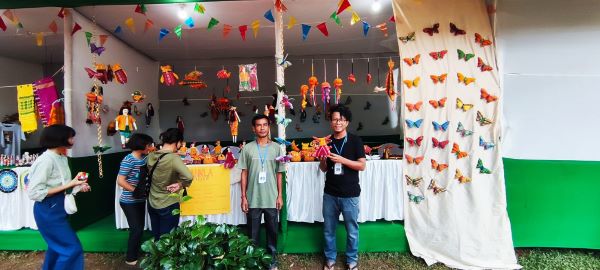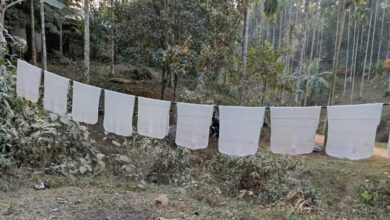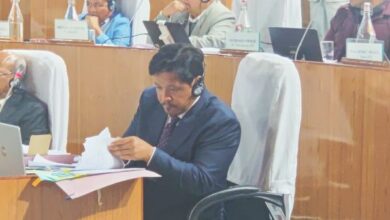Toy stories from across India
Artisans from NE & other parts of India share their experiences at Toys Craft Fair in Shillong, say they are disappointed by the poor response

Kirat Brahma’s toys have their unique stories, and so do the artisans who work with him. A designer from Baksa in Assam’s Bodoland, Brahma is in the city with his Zankla Studio artisans and their unique creations. But they are not the only ones with toy stories. Many artisans at the Toys Craft Fair, organised jointly by the Ministry of Textiles and Meghalaya Handloom and Handicrafts Development Corporation Ltd., have their narrations not only about their toys but also their lives and experiences in Shillong. Sunday Monitor met a few stall owners at the fair to learn about their local crafts and toys and whether new-age technology and games are threatening their businesses.
Preserving Bodo Heritage
Kirat Brahma, an alumnus of NID Ahmedabad, felt the need to preserve the heritage of the Bodos and what better way to do it than through toys. Brahma, along with his mother Bharati Brahma, started Zankla Studio in 2022 with eight artisans.
“Every toy — be it the water buffalo or the fairy — here has a story. And every toy has been made keeping in mind the minute details. For instance, the number of folds in the traditional cloth or the way it is wrapped,” explained Brahma, who is a trained graphic designer.
The toys are made from traditional clothes with different motifs, each of which has a meaning. “We are still perfecting the ways of making these toys. For instance, the rhinoceros is made of one piece of cloth and there are several fine folds to give the shape. This is a perfect piece and it could be achieved after several trials,” said Brahma, who is from Rangapani village in Baksa.
While the toys displayed at the stall waited to reveal their stories, Brahma spoke about his artisans whom he met in 2021. None was a toy maker and all learnt the methods through practice.
Sharma Baro, who is associated with Zankla as a supervisor, was a migrant worker in Gujarat. But when the pandemic hit, he, like millions of migrant workers in the country, was also affected. His wife, Rani, had a tailoring shop. She too had to shut up shop during Covid-19. Zankla uses her tailoring expertise and creativity for a variety of toys.
Another migrant worker, Umakanta Brahma aka Raja, lost his tailoring job in Gujarat during the pandemic and his talent was identified by the promoters of Zankla Studio. With his experience and expertise, he adds a special character to each hand-made toy.
Among Zankla’s artisans, 80% are women and include educated and creative youths. It is planning to take the number of artisans to 50 by next year. “Ours is a social enterprise that aims to support economically backward but talented people and at the same time help children learn about our rich culture and heritage through these toys. The demand for these toys is more in cities and developed nations,” Brahma told Sunday Monitor.
Tripura dolls & NE traditions

The row of dolls at Rima Debbarma’s stalls wore the traditional dresses of the northeastern states. Debbarma is a master craftsman from Tripura and has been making dolls for over a decade now. She is visiting Shillong with six artisans, including her daughter, son and sister. Of the dolls, the ones in the traditional Tripuri dresses are the most popular, she informed.
“The dolls are made of clothes after which they are coated with plaster of Paris. Making a doll does not take much time but drying the PoP is a challenge. After that, we take utmost care to adorn each doll with traditional clothes and ornaments of the respective tribes,” said Debbarma as she showed the Manipuri dancer, the Radha-Krishna pair and the Khasi dolls.
However, Debbarma is “really disappointed” with the response she is receiving at the fair. “There is barely any buyer and we are incurring losses. We have to pay for our food and lodging and if we cannot sell any doll, then it will be a total loss for us. We have never faced such a situation in other states. For instance, when visiting Odisha, we sold almost all the dolls we put on display. In Guwahati too, our dolls have great demand. It is not worth coming to Meghalaya,” she rued.
Despite the new-age options of toys, Debbarma’s hand-made toys have a niche market in Tripura. These dolls are also sold through Purbasha outlets in the northeastern state as well as in other states across India. As the master artisan spoke about her experiences in other states, she wondered whether the remaining days would be fruitful.
Necessity led to creativity
Kajal Sharma from Kolkata learned the art of making showpieces with wires from her husband. She was forced to

get into the business after her husband met with an accident that had a debilitating effect on his health. “He was bedridden for five years and I had exhausted all our savings for his treatment. I had to go out to earn a livelihood. So, I would take these handicrafts and sell them on a footpath. One day, a government official spotted me and allowed me to showcase the handicrafts in shops,” said Sharma as her eyes welled up.
Sharma’s stall has motorbikes and rickshaws made of wires. There are showpieces made of nails too. She said though the footfall at the fair was not great, she managed to sell many of her items. “This is my first time in Shillong. Besides selling the items, I have met many people here, some of whom were good to me,” she added.
However, another artisan from Kolkata, who opted to remain anonymous, did not have a pleasant experience in the hill city. She lost all her money, documents and mobile phone to a pickpocket in Police Bazar. Narrating her plight to Sunday Monitor, she said, “I was devastated. I had Rs 7,700 in my purse. The money was for the trip and to pay for my food and stay. Now, I am left with nothing. My train ticket is also gone. It was such a bitter experience on my first visit to Shillong. I went to the police to complain but nothing much has been done yet. If I cannot sell the hand-made soft toys, I will not be able to go home.”
Wooden wonders from Uttar Pradesh

Vijay Kumar Kharadi is carrying forward the family legacy of making wooden toys. The artisan is from Chitrakoot in the northern state of Uttar Pradesh. Chitrakoot is famous for its wooden toys which are sold in other districts in the state as well as in other parts of the country. His stall displayed an array of toys, including some musical ones, and tops.
“Making toys is our family business. I learned the art from my father and other elders in the family. Of course, children today have many options when it comes to modern toys but none can beat the fun of playing with wooden toys. There is a demand in the market for these,” he said.
But he reiterated what many artisans at the fair told Sunday Monitor. The sales are tepid and he is not breaking even. “Shillong is an expensive place and I have to pay for food and stay. From where will I get the money if I can’t sell these toys? I am selling some of these toys at a cheaper rate or else customers would not take them,” Kharadi added.
Most of the stalls, including Kharadi’s, were empty when Sunday Monitor visited the fair on Saturday. The artisan said the book fair on the same premises has also affected their business.
Crochet art from Arunachal & Nagaland
Yogum Duchok was busy crocheting when Sunday Monitor visited her stall. She was finishing one of the toys. The

stall displayed crochet souvenirs, which included dolls in traditional dresses of Nishi, Tagin and Adi tribes of Arunachal Pradesh. There were flowers made from bamboo and cane too.
“These crochet dolls are really popular in our state. I brought the raw materials for these toys as well as these bamboo flowers thinking that if there is a demand, then I would make more of these. But sales are very low and visitors are also few,” said the artisan.

The crochet toys could also be found in a Nagaland shop where two young artisans were selling them. Sweyievinu Lcho and Rokovonu Kechii are part of the NWVTI Emporium in Kohima. They got their training in making crochet toys at the emporium and this is their first time in Shillong.
Not only the stalls from other states are seeing less footfall but those set up by Meghalaya artisans are also seeing poor business. Precious Lyngdoh, who makes cane handicrafts, said it was disappointing to see such poor business.
“It is sad to see that such a unique event is getting such a poor response. The government should have advertised more and encouraged visitors by organising interactive programmes,” said a visitor on condition of anonymity.
The fair started on September 26 and will conclude on October 2.
~ Team Sunday Monitor





